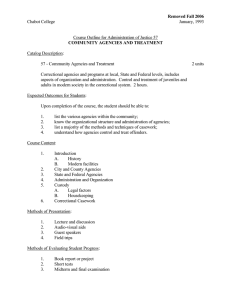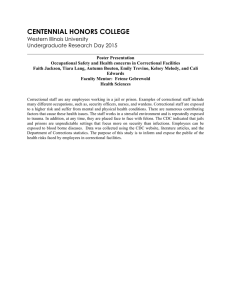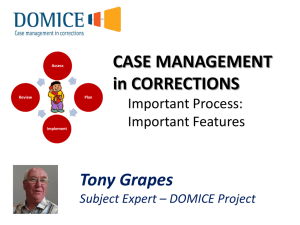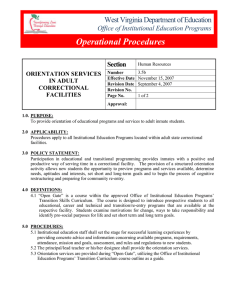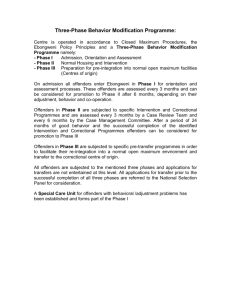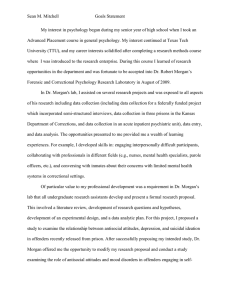The Correctional Investigator Canada 2008-2009 Report on Plans and Priorities
advertisement
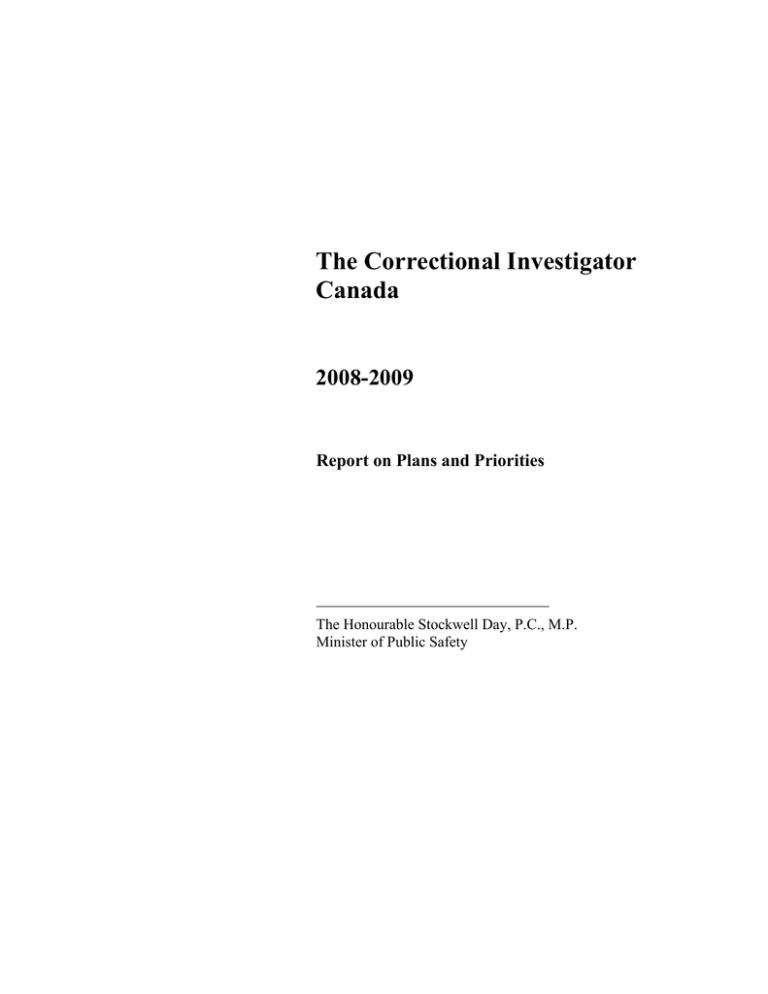
The Correctional Investigator Canada 2008-2009 Report on Plans and Priorities The Honourable Stockwell Day, P.C., M.P. Minister of Public Safety Table of Contents SECTION I: AGENCY OVERVIEW........................................................................ 3 1.1 Correctional Investigator’s Message................................................................... 3 1.2 Management Representation Statement.............................................................. 4 1.3 Raison d’être ....................................................................................................... 5 1.4 Organizational Information................................................................................. 5 1.5 Voted and Statutory Items displayed in the Main Estimates .............................. 8 1.6 Agency Planned Spending Table and Full-Time Equivalents ............................ 8 1.7 Summary Information......................................................................................... 9 1.8 Program Activities by Strategic Outcome .......................................................... 9 1.9 Departmental Plans and Priorities..................................................................... 10 SECTION II: ANALYSIS OF PROGRAM ACTIVITIES BY STRATEGIC OUTCOME ................................................................................................................. 15 2.1 Strategic Outcome............................................................................................. 15 2.2 Program Activity Name: Oversight of Correctional Operations ..................... 15 SECTION III— SUPPLEMENTARY INFORMATION ....................................... 17 3.1 Departmental links to the Government of Canada Outcomes .......................... 19 3.2 Services Received Without Charge .................................................................. 19 SECTION IV—OTHER ITEMS OF INTEREST ................................................... 20 4.1 Government on-line .......................................................................................... 20 4.2 Statutes and Regulations ................................................................................... 20 4.3 Reports and Discussion Papers ......................................................................... 20 4.4 References......................................................................................................... 21 Page 2 Office of the Correctional Investigator SECTION I: AGENCY OVERVIEW 1.1 Correctional Investigator’s Message As Canada’s Ombudsman for federal offenders offering independent oversight of federal Corrections, the Office of the Correctional Investigator (OCI) contributes to public safety and the promotion of human rights by providing independent and timely review of offender complaints. The OCI makes recommendations that assist in the development and maintenance of an accountable federal correctional system that is fair, humane and effective. In order to achieve this result for Canadians, the OCI monitors and investigates the acts, omissions, decisions and recommendations of the Correctional Service of Canada (CSC), so that CSC carries out its statutory mandate in compliance not only with its own policies and procedures, but also with its domestic and international legal and human rights obligations. Since its creation in 1973, the OCI has been an important part of safeguarding the rights of offenders and in making Canada a safer place. Public safety is enhanced by ensuring that offenders are treated fairly, provided the necessary assistance to become law-abiding citizens, and safely reintegrated into society in a timely and supported fashion. For 35 years, the OCI has played a vital role providing independent oversight and objective investigations of offender complaints as well as making recommendations to address systemic issues to improve Canada’s prison system, and ultimately public safety. The Correctional Service of Canada has identified the following five key priorities to guide its efforts to deliver the best possible correctional results consistent with its mandate: 1. Safe transition of eligible offenders into the community. 2. Safety and security for staff and offenders in our institutions. 3. Enhanced capacities to provide effective interventions for First Nations, Métis and Inuit offenders. 4. Improved capacities to address mental health needs of offenders. 5. Strengthened management practices. My Office agrees that substantive action on these priorities would go a long way toward addressing many of the long-standing areas of offender concern. In the next fiscal year, the Office will focus on the Correctional Service’s progress in addressing its five key priorities as they relate to offender concerns and on its ongoing response to the OCI’s Deaths in Custody Study (2007). As well, the OCI will continue to work with various stakeholders, and to increase our Office’s citizen engagement and its information program for offenders. Howard Sapers Correctional Investigator Section I: AGENCY OVERVIEW Page 3 1.2 Page 4 Management Representation Statement Office of the Correctional Investigator 1.3 Raison d’être The Office of the Correctional Investigator (OCI) provides Canadians with timely, independent, thorough and objective investigations into problems of offenders to ensure that it remains safe, secure, fair, equitable, humane, reasonable and effective. Essentially, its oversight role is to ensure that the Correctional Service of Canada (CSC) carries out its statutory mandate in compliance with its domestic and international policy, legal and human rights obligations. 1.4 Organizational Information Mandate The Office of the Correctional Investigator was established in 1973 pursuant to Part II of the Inquiries Act. With the proclamation in November 1992 of Part III of the Corrections and Conditional Release Act, the mandate of the Office was entrenched in its own legislation. The mandate of the Correctional Investigator, as defined by this legislation, is to function as an Ombudsman for federal offenders. The Correctional Investigator is independent of the Correctional Service of Canada and may initiate an investigation on receipt of a complaint by or on behalf of an offender, at the request of the Minister or on his own initiative. The Correctional Investigator is required by legislation to report annually through the Minister of Public Safety Canada to both Houses of Parliament. Mission Statement As Canada’s Ombudsman for federal offenders offering oversight of federal Corrections, the Correctional Investigator contributes to public safety and the promotion of human rights by providing independent and timely review of offender complaints. The Correctional Investigator makes recommendations that assist in the development and maintenance of an accountable federal correctional system that is fair, humane and effective. Program Activity and Resources The Office of the Correctional Investigator (OCI) has one Program Activity which is to contribute to the effective administration of Justice by conducting investigations into the problems of offenders related to decisions, recommendations, acts or omissions of the Commissioner of Corrections or any person under the control and management of, or performing service for or on behalf of the Commissioner of Corrections that affects offenders either individually or as a group, as detailed in Section 167 of the Corrections and Conditional Release Act (CCRA). Section 19 of the CCRA requires that the Office reviews all investigations performed by the Correctional Service of Canada following the death of or serious bodily injury to an inmate. The OCI is also committed to a similar review function with respect to Use of Section I: AGENCY OVERVIEW Page 5 Force interventions, in keeping with the recommendations of the Arbour Commission of Inquiry. The Office of the Correctional Investigator is lead by the Correctional Investigator who reports to Parliament through the Minister of Public Safety Canada. The Agency's resources provide for 24 full-time equivalents, of which twenty are directly involved, as intake officers, investigators, coordinators or directors, in the day to day addressing of inmate complaints. The total resources are $3,793,000 for the fiscal year 2008-2009. Page 6 Office of the Correctional Investigator 1.4.1 OCI Organization Chart Correctional Investigator Director of Policy and Senior Counsel Executive Director Director of Investigations Director of Investigations Senior Investigator, Investigators, Analysts Senior Investigator, Investigators, Analysts Coordinator Corporate Services and Planning (SFO) Coordinator S.19 and Use of Force Chief Administrative Services Analyst S.19 and Use of Force Coordinator Women Offender Issues Coordinator Aboriginal Offender Issues Intake Officers Section I: AGENCY OVERVIEW Page 7 1.5 Voted and Statutory Items displayed in the Main Estimates Vote or Statutory Item Truncated Vote or Statutory Wording 2008–09 Main Estimates 45 Program expenditures (S) Contributions to employee benefit plans Total Agency 1.6 2007–08 Main Estimates 3,341 2,773 452 359 3,793 3,132 Agency Planned Spending Table and Full-Time Equivalents ($ thousands) Oversight of Correctional Operations Total Main Estimates Adjustments: Supplementary Estimates Funding to address workload and human resources pressures resulting from the changing profile of federal offenders Operating Budget Carry Forward 2006-2007 Total Adjustments Total Planned Spending Plus: Cost of services received without charge Total Agency Spending Full-time Equivalents Forecast Spending 2007–08 Planned Spending 2008–09 Planned Spending 2009–10 3,793 3,793 3,162 3,162 3,082 3,082 34 275 3,407 3,793 3,162 3,082 394 3,801 22 486 4,279 30 188 3,350 24 165 3,247 24 3,132 3,132 Planned Spending 2010–11 241 Despite changes in the CSC offender profile and related growing complexity in investigations, the OCI funding has remained stable over the last decade. The OCI secured temporary funding in 2007-08 and 2008-09 to alleviate its increasing workload and to enhance its capacity to better respond to complaints of offenders with mental health issues. Given that the temporary funding will elapse at the end of March 2009, the OCI will continue to actively seek a permanent funding solution. Lack of permanent funding will hinder the OCI’s ability to meet its mandate and achieve its Plans and Priorities. Page 8 Office of the Correctional Investigator 1.7 Summary Information Financial Resources ($ thousands) 2008–09 2009–10 2010–11 $3,793 $3,162 $3,082 2008–09 2009–10 2010–11 30 24 24 Human Resources Agency Priorities Name Type 1. Investigate and resolve individual offender issues Ongoing 2. Investigate, monitor and resolve systemic offender issues Ongoing 3. Monitor, evaluate and provide representations on CSC’s management of mandated issues (s. 19 investigations and use of force incidents) Ongoing 4. Investigate, resolve and provide leadership on specifically identified issues of concern (Women and Aboriginal offenders, and Mental health issues) Ongoing 1.8 Program Activities by Strategic Outcome Planned Spending ($ thousands) Strategic Outcome: Oversight of Correctional Operations Expected Results 2008–09 2009–10 2010–11 The problems of offenders in the federal correctional system are identified and addressed in a timely and reasonable fashion To provide accessible and timely Ombudsman services to federal offenders Section I: AGENCY OVERVIEW 3,793 3,162 3,082 Contributes to the following priority Priorities 1-4 Priorities 1-4 Page 9 This year’s OCI Report on Plans and Priorities has been developed to ensure its compliance with recent Treasury Board policies. The reporting of Program sub-activities has been deleted, and the core Program Activity has been streamlined to ensure effective public reporting. The OCI’s Strategic Outcome is to ensure that the problems of offenders in the federal correctional system are identified and addressed in a timely and reasonable fashion. The oversight of correctional operations is achieved by providing accessible and timely Ombudsman services to federal offenders. 1.9 Departmental Plans and Priorities The primary legislative mandate of the OCI is to provide Canadians with independent investigation of the individual and systemic problems encountered by federal offenders as a result of decisions, recommendations, acts or omissions by the Correctional Service of Canada (CSC). Section 19 of its enabling legislation, the Corrections and Conditional Release Act also requires that it reviews all CSC Investigations convened following the death of or serious bodily injury to an offender. The OCI is also engaged in a similar review process of all use of force interventions by the Correctional Service. The maintaining of an independent and objective review process within a correctional environment where the Office has virtually no control over either the number of complaints or the extent of the required investigations presents a number of unique challenges. First, our mandate is national in scope and offers, by the sheer number and complexity of issues, an endless supply of difficulties, opportunities and shifting priorities. Our client base and network of stakeholders are dispersed in a large number of often geographically remote locations throughout Canada. Second, the resolution of disputes in an environment traditionally closed to public scrutiny with an understandably high level of mistrust between correctional officials and offenders, requires that the Office not only be, but be seen to be independent of both the Correctional Service, the Department of Public Safety and the Minister. Third, given that the authority of the Office rests with its power of persuasion and public reporting rather than enforceable recommendations, it is imperative that appropriate administrative and political mechanisms be available to ensure that reasonable, fair, timely, thorough and humane action is taken on the findings made by the OCI. The OCI does not foresee a decline in either the overall demand for services or in the complexity of the issues the OCI is called upon to address. The environment in which the OCI operates continues to be extremely challenging. Moving forward requires not only innovative and dedicated services, but also sound risk management, knowledge-driven decision-making, rigorous stewardship, clear accountabilities and responsible spending. The OCI’s Program Activity (PA) is the “Oversight of Correctional Operations” and its Strategic Outcome (SO) is “the problems of offenders in the federal correctional system are identified and addressed in a timely and reasonable fashion”. Page 10 Office of the Correctional Investigator Priority 1 Investigate and resolve individual offender issues The role of the Correctional Investigator is that of an Ombudsman for federal offenders. The primary function of the Office is to investigate and bring resolution to individual offender complaints. The vast majority of the concerns raised on complaints are addressed by OCI at the institutional level through direct contact and communications with offenders and CSC staff. Plans The OCI will visit all institutions, according to its frequency schedule/institutional security level. Its investigative staff will then interview offenders (and those acting on their behalf) and will maintain accessibility through regular correspondence, e-mail and telephone. OCI investigators will address all offender issues in a timely fashion; prioritizing those they consider being of an urgent nature. In so doing, they investigate concerns and make recommendations to CSC officials at all levels, while always striving to secure resolution at the lowest possible organizational level. Moreover, the OCI’s investigative staff will ensure, through follow-up and impact analysis, that CSC’s response to its queries and recommendations be timely, fair, thorough, equitable, reasonable and effective. Finally the OCI will exercise, where appropriate, its prerogative to investigate, on its own initiative, any issue affecting one or more offenders. Priority 2 Investigate, resolve and follow-up on systemic offender issues While the primary role of the Office of the Correctional Investigator is to investigate and resolve complaints from individual offenders, it has, as well, the responsibility to review and make recommendations on the Correctional Service of Canada’s policies and procedures associated with the areas of individual complaints to ensure that systemic areas of concern are identified and appropriately addressed. Plans Prior to each institutional visit, the OCI investigator will monitor, through a review and comparative analysis of CSC’s own statistics, the institution’s performance in the OCI’s Areas of Concern (long-standing systemic areas of OCI concern that are closely linked to an offender’s rights and liberty; issues such as timely conditional release consideration and effective internal redress). Section I: AGENCY OVERVIEW Page 11 During the visit, the OCI investigator will raise any shortcomings with the Warden and where appropriate will make recommendations. The implementation of those recommendations will be monitored through a review of the institution’s performance prior to the next visit, with the OCI always having the option of addressing its concerns at the regional or national level of CSC. During each institutional visit, OCI investigative staff will also meet with the Inmate Committee and where appropriate, with other offender groups such as Native Brotherhoods and Sisterhoods. Investigators will then hold timely discussions with CSC authorities and where appropriate, make recommendations related to the systemic issues raised by these groups; striving to achieve resolution at the institutional level. As in the case of individual offender concerns, OCI investigative staff will subsequently monitor and evaluate, through follow-up and impact analysis, the timeliness and overall quality of CSC’s response. Priority 3 Monitor, evaluate, and provide representations on CSC’s management of mandated issues (s.19 investigations and Use of Force incidents) Section 19 of the Corrections and Conditional Release Act implicitly requires that the Office of the Correctional Investigator (OCI) review all investigations conducted by the Correctional Service of Canada following the death of or serious bodily injury to an inmate. The OCI is also engaged in similar reviews of use of force interventions. Plans The OCI Coordinator of s.19 investigations and Use of Force Issues, with the assistance of an analyst, will review CSC s.19 investigations and CSC reports, including videotapes related to Use of Force incidents, as per OCI’s standardized review procedure and timeliness benchmarks. Initially determined will be CSC’s compliance with the agreed upon timeliness for providing the OCI with all the required s.19 investigation reports. Subsequently, the OCI’s review will focus on identifying instances of CSC noncompliance within the law and its own policy regarding the Use of Force or flaws in CSC s.19 investigative reports. Finally, the Coordinator will make representations and/or recommendations to CSC officials at the appropriate level and monitor and evaluate, through follow-up and impact analysis, the timeliness and overall quality of CSC’s response. Page 12 Office of the Correctional Investigator Priority 4 Investigate, resolve and provide leadership on specifically identified issues (Women and Aboriginal Offenders, and Mental Health) The Office of the Correctional Investigator (OCI) conducts specialized investigations and attempts to resolve the issues raised by or on behalf of Women and Aboriginal Offenders. In cooperation with its partners, both governmental and non-governmental, it provides observations, advice, and direction to the Correctional Service of Canada and others regarding these issues. Plans Under the guidance of the Coordinators of Women Offender Issues and of Aboriginal Offender Issues, OCI investigators will deal with individual and systemic issues brought to their attention by Women and Aboriginal Offenders, in essentially the same manner as described above,. OCI investigators will also meet, during each visit with Native Brotherhoods and Sisterhoods and where appropriate, with institutional Elders, Native Liaison Officers and Regional Elder Advisory Committees. Moreover, OCI coordinators will focus on a number of issues which are specific to or which continue to have considerably more impact on those sub-groups than on the general offender population. Finally, both Coordinators (Aboriginal Offender Issues and Women Offender Issues) will assume a national leadership role on key issues affecting their respective areas of responsibility. They will prioritize, within their strategic planning process, the development of collaborative and mutually beneficial working relationships with groups and associations in the public and non-governmental sectors, which are involved in the betterment of corrections for Women and Aboriginal Offenders. Mental Health Services will remain an area of special interest. Despite not having received full funding, the OCI will increase its outreach efforts towards offenders suffering from mental health issues within its current fiscal envelope. It will also focus its monitoring of Correctional Services of Canada’s (CSC) investigative efforts, in the Mental Health component of the correctional treatment it offers to incarcerated Canadians. The OCI will pursue its dialogue with CSC Officials, at all levels, on the topics of assessment, access to, and quality of CSC Mental Health Services both within institutions and community settings. The situation of Women Offenders and Aboriginal Offenders, in that regard will be the subject of particular attention. Section I: AGENCY OVERVIEW Page 13 In practical terms, the Directors of Investigations will be required to champion the mental health issues and to ensure that there is a continued focus by the Investigators on the identified mental health issues. They will be responsible for identifying patterns of issues, pursuing these at the regional level and ensuring that the OCI has a picture of the entire system, not just their individual regions. Each Investigator will be required to monitor identified mental health related issues at each of the medium and maximum security sites for which they are responsible. These identified issues become part of the OCI Areas of Focus, reportable semi-annually. Each Investigator is also responsible for the management of individual mental health related complaints, from receipt to conclusion, as per current practice; for relationship building with Mental Health Teams/professionals at sites and for the critical sharing of information with OCI colleagues and Directors of Investigations. Page 14 Office of the Correctional Investigator SECTION II: ANALYSIS OF PROGRAM ACTIVITIES BY STRATEGIC OUTCOME 2.1 Strategic Outcome The OCI’s only Strategic Outcome (SO) is “The problems of offenders in the federal correctional system are identified and resolved in a timely fashion”. Its only Program Activity (PA) is the “Oversight of Correctional Operations”, which regroups the four OCI Priorities described above in Section 1.3. 2.2 Program Activity Name: Oversight of Correctional Operations Financial Resources 2008–09 2009–10 2010–11 $3,793 $3,162 $3,082 2008–09 2009–10 2010–11 30 FTE 24 FTE 24 FTE Human Resources Through this program activity, the Office of the Correctional Investigator (OCI) conducts investigations of individual offender complaints regarding acts, omissions, decisions and recommendations of the Correctional Service of Canada (CSC). It also has a responsibility to review and make recommendations on CSC’s policies and procedures associated with the areas of individual complaints, to ensure that systemic areas of complaint are identified and appropriately addressed, and to review all Section 19 investigations performed by CSC following the death of or serious injury to an inmate. Section II: ANALYSIS OF PROGRAM ACTIVITY BY STRATEGIC OUTCOME Page 15 Expected Results To provide accessible and timely Ombudsman services to federal offenders Indicators 1. Level of service: Percentage of OCI responses to offender complaints 2. Accessibility: Number of contacts, institutional visits and interviews (s. 169, CCRA) 3. Timeliness: OCI response time to offender complaints and referrals Data Source(s)/ Target Frequency (March 31, 2009) DATIS/ 1. 96% Semi-Annual 2. 95% quarterly visits to maximum and medium security institutions and 95% semi-annual visits to minimum security institutions 3. OCI timeliness standards: internal response = 90% within 5 days; inquiry = 85% within 15 days; investigation = 80% within 45 days The OCI’s Strategic Outcome is to ensure that the problems of offenders in the federal correctional system are identified and addressed in a timely and reasonable fashion. The oversight of correctional operations is achieved by providing accessible and timely Ombudsman services to federal offenders. The level of service is measured by the percentage of OCI responses to offender complaints; the accessibility is measured by the number of contacts, institutional visits and interviews; and the timeliness is measures by the OCI response time to offender complaints and referrals. The main monitoring tools are the OCI’s computerized data collection system (DATIS) and the OCI Investigators’ semi-annual reports. The proposed targets for the upcoming year have been set high and should be achievable within planned spending. Page 16 Office of the Correctional Investigator SECTION III— SUPPLEMENTARY INFORMATION The Deaths in Custody Study and Follow-ups We continue to be concerned about the high number of deaths and injuries in federal institutions. In our last Annual Report 2006-07, the Office reported on the findings of a study that examined all reported deaths—due to factors other than natural causes—that occurred over a five-year period in Canadian federal correctional institutions. The study included all deaths that the Correctional Service had determined were homicides, suicides, overdoses or accidents. The project was designed to identify areas in which improvements might enhance the Correctional Service’s ability to prevent or appropriately respond to assaults and self-injury in the future. The Deaths in Custody Study examined 82 reported suicides, homicides and accidental deaths in custody from 2001 to 2005, inclusively. The research reviewed CSC board of investigation reports and action plans, coroners’ reports, correspondence between CSC and both the OCI and coroners’ offices, and other documents pertaining to each fatality. The Deaths in Custody Study presented disturbing findings. The report provided evidence that the Correctional Service must enhance its capacity to focus on observations and recommendations related to deaths in custody. The Correctional Service failed to consistently incorporate lessons learned and implement corrective action over time and across regions, as similar errors are repeated, and similar findings and recommendations are being made time and again. The study also suggested that the Correctional Service resists or fails to reasonably act on a large proportion of coroners’ findings and recommendations, compared to the findings and recommendations of its own boards of investigation. The report concludes that “…the Service fell short in implementing its own policies and practices, and in doing everything possible to avert a fatality.” The Correctional Service has indicated a willingness to address many of the Deaths in Custody Study’s findings. In the next year, the OCI will continue to monitor CSC’s progress in an attempt to make sure that it adheres to—or, in some instances, alters— existing procedures and practices to ensure timely: • • • • convening of investigations; meaningful analysis of completed investigation reports; approval by the Correctional Service’s Executive Committee (EXCOM) of recommendations and action plans developed in response to national investigative reports; and consistent implementation, follow-up and monitoring of actions taken in response to approved recommendations. Section III: SUPPLEMENTARY INFORMATION Page 17 China Project The Office was selected to be the lead partner on an important project, fully funded by the Canadian International Development Agency, with the prison administration of China. The Jail Supervision Division of the Penitentiary Administration Bureau of the Chinese Public Security Ministry (JSD) openly acknowledged significant human rights challenges in its prisons and demonstrated an interest in responding to a recent report of the UN Special Rapporteur against Torture. The UN report was critical of Chinese authorities’ treatment of their prisoners. This project is unique because the JSD is partnering directly with our Office, whose statutory mandate includes making recommendations on human rights compliance. The Office was specifically selected for this project because of its unique mandate and its established expertise in human rights in correctional settings. After an initial development phase of the project, a first study tour took place in Canada between June 30 and July 10, 2007. The study tour focused on policy and legal issues as they pertain to human rights of detainees and prisoners. The purpose of the first study tour was to introduce the Chinese senior officials to the Canadian policy making process as well as best practices in prison management/administration. The Chinese senior officials were also exposed to Canadian legal and policy experts, management and correctional training officials, and prison administrators of detention centres and penitentiaries to hear their views about best practices, the protection of human rights in prison settings and the importance of internal and external oversight mechanisms. A second study tour is planned for spring 2008, and will focus on operational issues related to the management of women and Aboriginal offenders, as well as offenders with mental illness. In the last phase of the project scheduled for 2009, the final seminar and field visit will provide an opportunity for the Chinese senior officials to present their final report and recommendations for policy reforms in the areas of human rights compliance and enhanced jail management/administration. This report will incorporate the results of the survey conducted by JSD on problems in jails and human rights. The Canadian delegation will have an opportunity to offer comments and feedback on the Chinese recommendations for reforms and final report. A panel format was proposed which would include a China/Canada dialogue on best practices and approaches in the area of prison management and human rights. Page 18 Office of the Correctional Investigator 3.1 Departmental links to the Government of Canada Outcomes Strategic Outcome: The problems of offenders in the federal correctional system are identified and addressed in a timely and reasonable fashion Planned Spending Alignment to (in thousands) Government of Expected Canada Outcome Results 2008–09 2009–10 2010–11 Area Oversight of $3,793 $3,162 $3,082 Safe and Secure To provide Correctional Communities accessible Operations and timely Ombudsman services to federal offenders. 3.2 Services Received Without Charge ($ thousands) 2008–09 Accommodation provided by Public Works and Government Services Canada 279 Contributions covering employers’ share of employees’ insurance premiums and expenditures paid by the Treasury Board of Canada Secretariat (excluding revolving funds) 207 Total services received without charge 486 NOTE: This table can also be found on the Treasury Board Secretariat's website at http://publiservice.tbs-sct.gc.ca/est-pre/20082009/p3a_e.asp. Section III: SUPPLEMENTARY INFORMATION Page 19 SECTION IV—OTHER ITEMS OF INTEREST 4.1 Government on-line Website: http://www.oci-bec.gc.ca Email: org@oci-bec.gc.ca 4.2 Statutes and Regulations Corrections and Conditional Release Act, S.C. 1992 Part 3 4.3 Reports and Discussion Papers - Correctional Investigator’s Annual Reports, 1998-1999 to Present (http://www.oci-bec.gc.ca) ¸ - OCI’s Deaths in Custody Study, June 27, 2007 (http://www.oci-bec.gc.ca) - Correctional Investigator’s Presentation to the Correctional Service of Canada Review Panel, June 27, 2007 (http://www.oci-bec.gc.ca) - Correctional Investigator’s Presentation to the Senate Committee on Social Affairs, Science and Technology: Mental Health, Mental Illness and Addiction, June 7, 2005 (http://www.oci-bec.gc.ca) - Previous OCI Departmental Performance Reports and OCI Reports on Plans and Priorities (http://www.oci-bec.gc.ca) - The Senate of Canada’s Out of the Shadows at Last – Transforming Mental Health on Addiction Services in Canada, May 2006 (http://www.parl.gc.ca) Page 20 Office of the Correctional Investigator 4.4 References Name Howard Sapers Ed McIsaac Mary-Anne Ruedl Title Address Tel. No. Fax No. Correctional Investigator P.O. Box 3421 Station “D” Ottawa, Ontario K1P 6L4 (613) 990-2689 (613) 990-9091 Executive Director P.O. Box 3421 Station “D” Ottawa, Ontario K1P 6L4 (613) 990-2691 (613) 990-9091 Coordinator, Corporate Services and Planning P.O. Box 3421 Station “D” Ottawa, Ontario K1P 6L4 (613) 990-2694 (613) 990-9091 Section IV: OTHER ITEMS OF INTEREST Page 21
